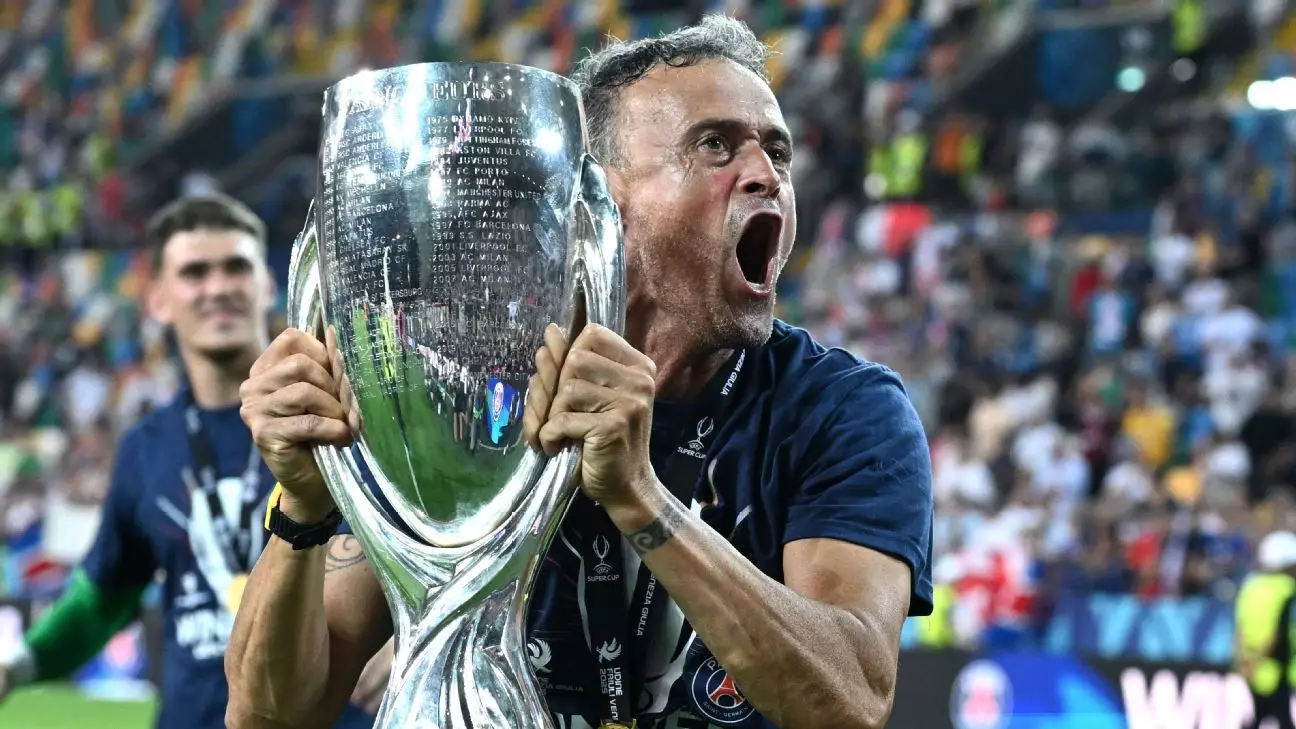In the high-stakes realm of football, surface narratives often overshadow deeper truths. Paris Saint-Germain’s recent triumph over Tottenham Hotspur in the UEFA Super Cup exemplifies this phenomenon. While the scoreboard declared a dramatic victory, the reality of the match exposes a complex interplay of luck, fitness disparities, and psychological resilience that defies simplistic notions of deservingness. Coach Luis Enrique’s candid admission that his team “didn’t deserve” to win underscores a rare level of self-awareness yet also beckons us to question the narrative of meritocracy that often pervades sports commentary.
Despite PSG’s eventual success through penalties, their late rally reveals not a dominant force but a fragile psyche buoyed by fleeting hope. This game was less a showcase of skill and more a testament to resilience under pressure—traits that often manifest not through consistent performance but in moments of crisis. Enrique’s acknowledgment of Tottenham’s superior preparedness and fitness levels reveals a broader critique of how physical conditioning translates into match dominance. PSG’s recent return to play after a grueling journey to the Club World Cup potentially diminished their stamina, exposing a vulnerability at the heart of elite competition: endurance matters as much as tactical discipline.
Fitness and Preparation: The Invisible Pillars of Success
One cannot ignore the stark contrast in training routines between the two teams, which became evident as the match progressed. Tottenham’s six-week preparation period mindfully built their stamina, sharpness, and team cohesion, resulting in a commanding 2-0 lead at the 85th minute. PSG, on the other hand, had only had six days to reassemble after their exhaustive commitments abroad. This disparity illuminates a critical, often overlooked aspect of football: fitness and timing can be the decisive factors that determine the outcome of a match, especially when the margins are razor-thin.
The fact that PSG managed to snatch victory at the death suggests a mental fortitude rooted in sheer hope rather than tactical superiority. Lee Kang-in’s goal and Gonçalo Ramos’s injury-time equalizer highlighted the importance of mental resilience, but they also underscored that luck played an outsized role. The probability of PSG overcoming physical fatigue and mental fatigue simultaneously borders on the miraculous, serving as a reminder that in football, victory often emerges from the confluence of physical endurance and mental steadfastness, not just skill or strategy.
Goalkeeper Dynamics and the Cost of Transitions
Lucas Chevalier’s debut spotlighted the volatile nature of goalkeeper decisions and the consequences of transition. Stepping in for Gianluigi Donnarumma—who was absent due to a club departure—Chevalier suffered early and costly mistakes, yet also demonstrated resilience by saving a Spurs penalty in the shootout. His performance epitomized the unpredictable pressure goalkeepers face when thrust into high-profile scenarios with little preparation time.
This situation also raises questions about PSG’s planning and confidence in their squad depth. Donnarumma’s departure signals a shift in club strategy, and Chevalier’s inconsistent performance underlines how the burden of leadership in football extends beyond talent to psychological readiness. Success in modern football involves more than physical attributes; it demands mental toughness and the capacity to withstand pressure, especially for players in pivotal positions.
The Power of Resilience and Personalities
Luis Enrique’s statement on Donnarumma’s departure emphasizes the importance of personality in elite sport. Recognizing the composure and mental strength of his squad—especially in moments of adversity—reflects a broader philosophy that resilience, more than pure talent, shapes champions. The match, especially the shootout, demonstrated that success often belongs to those who can maintain their composure amid chaos and failure.
Vitinha’s comments on team cohesion reflect a shift towards valuing collective resilience. The narrative here is not solely about individual brilliance but about a team’s capacity to uplift each other when morale is tested. When players step up after mistakes and rally to win, it ensures that victory is not just about skill but about unyielding belief—a trait that can propel underdog teams to improbable victories.
This match challenges us to look beyond the surface. PSG’s ‘rescue’ act was less an affirmation of deserved victory and more a testament to the unpredictable, fragile nature of football at the highest level. It underscores that resilience, mental toughness, and a pinch of luck often determine outcomes more than talent alone. Recognizing this makes the victory not just a moment of celebration but a reflection on what truly separates champions from the rest: an unrelenting spirit that refuses to fade even when circumstances seem insurmountable.


Leave a Reply